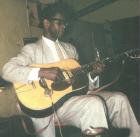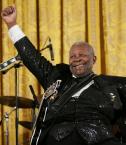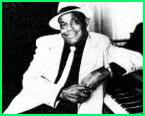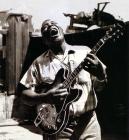A History of the Blues: Chapter 7
.
Note :- 1950’s - Britain – A new type of music crept in; a combination of country, folk & blues = Skiffle. Chris Barber, the trombone player, was the first person to bring people like Big Bill Broonzy & Muddy Waters to Britain. In the middle of his traditional jazz sessions, he had a little skiffle section, named after a record called ‘Home town skiffle’. Lonnie Donegan played in this little segment, which just took off & skiffle became enormous. Everybody in the 60’s rock bands – The Who, Led Zep, The Stones, The Beatles – started off playing skiffle. After Donegan went on to greater fame, Chris barber replaced him with a blues segment, & the guitarist there was Alexis Korner. So, the British blues boom started from Skiffle.
1950 - The Weaver’s version of leadbelly’s ‘Goodnight Irene’ sells over 2 million copies.
1950 - The Weaver’s version of leadbelly’s ‘Goodnight Irene’ sells over 2 million copies.

1/ Dust my broom – Elmore James. 1951. Greatest hits
B. 1918, Miss. D.1963, Ill. The most influential post war slide guitarist. Was a radio repair man by trade, which helped with amplification of his guitar. Actually travelled with Robert Johnson for a while, in fact, this track, his first recording, is an update of Johnsons ‘I believe I’ll dust my broom’. Had one of the earliest (& best) Chicago blues bands in the ‘Broomdusters’. In spite of his talent, was very unsure of his own abilities.
2/ Walkin’ the boogie – John Lee Hooker. 1952. Chess blues
3/ Juke – Little Walter. 1952. Blues with a feelin’
B.1930, La. D.1968, Ill. Was probably the most influential of all harmonica players. Left home at 12 years old for New Orleans. Gradually worked his way up to Chicago by 1946. Joined Muddy Waters in ’48. This band (which included Jimmy Rogers) used to go into other clubs after their gigs & play all of the other bands off the stage. He had 14 solo hits from 1952 – 58. Had a vicious temper & descended into extreme alcoholism. Was beaten to death in a street fight.
4/ Conjur man – Memphis Minnie.1952. Chess blues
5/ No ridin’ blues – Charley Booker. 1952. Chasin’ that devil music
B.1925, Miss. Although he could possibly still be alive, virtually nothing known about him.
B. 1918, Miss. D.1963, Ill. The most influential post war slide guitarist. Was a radio repair man by trade, which helped with amplification of his guitar. Actually travelled with Robert Johnson for a while, in fact, this track, his first recording, is an update of Johnsons ‘I believe I’ll dust my broom’. Had one of the earliest (& best) Chicago blues bands in the ‘Broomdusters’. In spite of his talent, was very unsure of his own abilities.
2/ Walkin’ the boogie – John Lee Hooker. 1952. Chess blues
3/ Juke – Little Walter. 1952. Blues with a feelin’
B.1930, La. D.1968, Ill. Was probably the most influential of all harmonica players. Left home at 12 years old for New Orleans. Gradually worked his way up to Chicago by 1946. Joined Muddy Waters in ’48. This band (which included Jimmy Rogers) used to go into other clubs after their gigs & play all of the other bands off the stage. He had 14 solo hits from 1952 – 58. Had a vicious temper & descended into extreme alcoholism. Was beaten to death in a street fight.
4/ Conjur man – Memphis Minnie.1952. Chess blues
5/ No ridin’ blues – Charley Booker. 1952. Chasin’ that devil music
B.1925, Miss. Although he could possibly still be alive, virtually nothing known about him.

6/ Three o’ clock blues – B.B.King. 1952. King of the blues
7/ Hoochie coochie man – Muddy Waters. 1954. Boxed set
8/ Reconsider baby – Lowell Fulson. 1954. Chess blues
B.1921, Ok. Played around his local area at first then in 1940, toured with Texas Alexander. In the navy from 1943-45. Went to California in ’45, where he enlisted a band & made his first record. Had a huge hit in ’48 with 3 o’ clock blues, which he wrote. (Was later a hit for B.B.King). He still tours & records, & plays all types of roots music.
Note – 1955 - Emmett Till, a black teenager from Chicago, is murdered for talking out of turn to a white woman near Money, Mississippi.
9/ My babe – Little Walter. 1955. Blues with a feelin’
7/ Hoochie coochie man – Muddy Waters. 1954. Boxed set
8/ Reconsider baby – Lowell Fulson. 1954. Chess blues
B.1921, Ok. Played around his local area at first then in 1940, toured with Texas Alexander. In the navy from 1943-45. Went to California in ’45, where he enlisted a band & made his first record. Had a huge hit in ’48 with 3 o’ clock blues, which he wrote. (Was later a hit for B.B.King). He still tours & records, & plays all types of roots music.
Note – 1955 - Emmett Till, a black teenager from Chicago, is murdered for talking out of turn to a white woman near Money, Mississippi.
9/ My babe – Little Walter. 1955. Blues with a feelin’

10/ Walking the blues – Willie Dixon. 1955. Chess blues
B.1915, Miss. D.1992, Calif. One of the greatest of all blues songwriters (& bass players). When he first arrived in Chicago, he won the Golden Gloves heavyweight boxing championship but turned to music, which was (slightly!) less dangerous. Played, for several years in the mid 40’s, as a member of the Big Three trio. Wrote songs for all of the great Chicago blues players & worked for the Chess label. Sued Chess for outstanding royalties in the 70’s & settled out of court. Spent the rest of his life recording intermittently & helping other musicians to get their royalty dues.
11/ Bo Diddley – Bo Diddley. 1955. Jungle music
B.1928, Miss. Studied classical violin but changed direction when he heard John Lee Hooker in the late ‘40’s. Bridged African based rhythms & modern day rap. He was one of the early Rock & Rollers & signed to Chess in the mid 50’s. In Britain he was as highly regarded as Muddy Waters & Chuck Berry, & was a great live performer. The Rolling Stones ‘borrowed’ many of his riffs & he even toured with the Clash. Still plays occasionally.
12/ Don’t start me to talkin’ - Sonny Boy Williamson (2). 1955. Chess blues
B. 1899(?), Miss. D.1965, Ar. Sonny Boy Williamson was, in many ways, the ultimate blues legend. By the time of his death in 1965, he had been around long enough to have played with at the start of his career and , and at the end of it. In between, he drank a lot of whiskey, hoboed around the country, had a successful radio show for 15 years, toured Europe to great acclaim and simply wrote, played and sang some of the greatest blues ever recorded. His delivery was sly, evil and world-weary, while his harp-playing was full of short, rhythmic bursts one minute and powerful, impassioned blowing the next. Though he took his name from another well-known harmonica player, no one really sounded like him. A moody, bitter, and suspicious man, no one wove such a confusing web of misinformation as Sonny Boy Williamson II. Even his birth date (stated as December 5, 1899 in most reference books, but some sources claim his birth may have been in either 1897 or 1909) and real name (Aleck or Alex or Willie "Rice" — which may or may not be a nickname — Miller or Ford) cannot be verified with absolute certainty.
B.1915, Miss. D.1992, Calif. One of the greatest of all blues songwriters (& bass players). When he first arrived in Chicago, he won the Golden Gloves heavyweight boxing championship but turned to music, which was (slightly!) less dangerous. Played, for several years in the mid 40’s, as a member of the Big Three trio. Wrote songs for all of the great Chicago blues players & worked for the Chess label. Sued Chess for outstanding royalties in the 70’s & settled out of court. Spent the rest of his life recording intermittently & helping other musicians to get their royalty dues.
11/ Bo Diddley – Bo Diddley. 1955. Jungle music
B.1928, Miss. Studied classical violin but changed direction when he heard John Lee Hooker in the late ‘40’s. Bridged African based rhythms & modern day rap. He was one of the early Rock & Rollers & signed to Chess in the mid 50’s. In Britain he was as highly regarded as Muddy Waters & Chuck Berry, & was a great live performer. The Rolling Stones ‘borrowed’ many of his riffs & he even toured with the Clash. Still plays occasionally.
12/ Don’t start me to talkin’ - Sonny Boy Williamson (2). 1955. Chess blues
B. 1899(?), Miss. D.1965, Ar. Sonny Boy Williamson was, in many ways, the ultimate blues legend. By the time of his death in 1965, he had been around long enough to have played with at the start of his career and , and at the end of it. In between, he drank a lot of whiskey, hoboed around the country, had a successful radio show for 15 years, toured Europe to great acclaim and simply wrote, played and sang some of the greatest blues ever recorded. His delivery was sly, evil and world-weary, while his harp-playing was full of short, rhythmic bursts one minute and powerful, impassioned blowing the next. Though he took his name from another well-known harmonica player, no one really sounded like him. A moody, bitter, and suspicious man, no one wove such a confusing web of misinformation as Sonny Boy Williamson II. Even his birth date (stated as December 5, 1899 in most reference books, but some sources claim his birth may have been in either 1897 or 1909) and real name (Aleck or Alex or Willie "Rice" — which may or may not be a nickname — Miller or Ford) cannot be verified with absolute certainty.

13/ Smokestack lightning – Howlin’ Wolf. 1956. Chess box
Note:- 1957 - Rev. Dr. Martin luther king is named president of the newly formed Southern Christian Leadership Conference. (SCLC)
14/ Honest I do - Jimmy Reed. 1957. Honest I do
B.1925, Miss. D.1975, Calif.There's simply no sound in the blues as easily digestible, accessible, instantly recognizable, and as easy to play and sing as the music of Jimmy Reed. His best-known songs have become an integral part of the standard blues repertoire. Because his style was simple and easily imitated, his songs were accessible to just about everyone from high-school garage bands to , , , , and , making him one of the most influential bluesman of all. Played with several bands & on the Chicago streets in the early 50’s. Was stricken with epilepsy in 1957, but was not diagnosed at first because he was a hopeless alcoholic.
15/ Going down the river - Mississippi Fred McDowell. 1959. The first recordings
Chess label – Leonard (B.1917) & Philip (B.1922) Chez (soon changed to Chess) arrived in America from Poland with their mother, father & sister in 1928. Grew up on the rough south side of Chicago. Leonard started a club whilst Phil was in the army in w.w.2. In 1947 Leonard bought into the small Aristocrat label. Phil soon joined him & was left to run things whilst Len travelled as far as 1000 mile radius of Chicago pushing their recordings. At this time they recorded a variety of popular music types but soon the blues started to sell best & the Chess label took off.
Note:- 1957 - Rev. Dr. Martin luther king is named president of the newly formed Southern Christian Leadership Conference. (SCLC)
14/ Honest I do - Jimmy Reed. 1957. Honest I do
B.1925, Miss. D.1975, Calif.There's simply no sound in the blues as easily digestible, accessible, instantly recognizable, and as easy to play and sing as the music of Jimmy Reed. His best-known songs have become an integral part of the standard blues repertoire. Because his style was simple and easily imitated, his songs were accessible to just about everyone from high-school garage bands to , , , , and , making him one of the most influential bluesman of all. Played with several bands & on the Chicago streets in the early 50’s. Was stricken with epilepsy in 1957, but was not diagnosed at first because he was a hopeless alcoholic.
15/ Going down the river - Mississippi Fred McDowell. 1959. The first recordings
Chess label – Leonard (B.1917) & Philip (B.1922) Chez (soon changed to Chess) arrived in America from Poland with their mother, father & sister in 1928. Grew up on the rough south side of Chicago. Leonard started a club whilst Phil was in the army in w.w.2. In 1947 Leonard bought into the small Aristocrat label. Phil soon joined him & was left to run things whilst Len travelled as far as 1000 mile radius of Chicago pushing their recordings. At this time they recorded a variety of popular music types but soon the blues started to sell best & the Chess label took off.